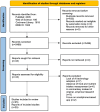Artificial Intelligence Applications to Measure Food and Nutrient Intakes: Scoping Review
- PMID: 39608003
- PMCID: PMC11638690
- DOI: 10.2196/54557
Artificial Intelligence Applications to Measure Food and Nutrient Intakes: Scoping Review
Abstract
Background: Accurate measurement of food and nutrient intake is crucial for nutrition research, dietary surveillance, and disease management, but traditional methods such as 24-hour dietary recalls, food diaries, and food frequency questionnaires are often prone to recall error and social desirability bias, limiting their reliability. With the advancement of artificial intelligence (AI), there is potential to overcome these limitations through automated, objective, and scalable dietary assessment techniques. However, the effectiveness and challenges of AI applications in this domain remain inadequately explored.
Objective: This study aimed to conduct a scoping review to synthesize existing literature on the efficacy, accuracy, and challenges of using AI tools in assessing food and nutrient intakes, offering insights into their current advantages and areas of improvement.
Methods: This review followed the PRISMA-ScR (Preferred Reporting Items for Systematic Reviews and Meta-Analyses extension for Scoping Reviews) guidelines. A comprehensive literature search was conducted in 4 databases-PubMed, Web of Science, Cochrane Library, and EBSCO-covering publications from the databases' inception to June 30, 2023. Studies were included if they used modern AI approaches to assess food and nutrient intakes in human subjects.
Results: The 25 included studies, published between 2010 and 2023, involved sample sizes ranging from 10 to 38,415 participants. These studies used a variety of input data types, including food images (n=10), sound and jaw motion data from wearable devices (n=9), and text data (n=4), with 2 studies combining multiple input types. AI models applied included deep learning (eg, convolutional neural networks), machine learning (eg, support vector machines), and hybrid approaches. Applications were categorized into dietary intake assessment, food detection, nutrient estimation, and food intake prediction. Food detection accuracies ranged from 74% to 99.85%, and nutrient estimation errors varied between 10% and 15%. For instance, the RGB-D (Red, Green, Blue-Depth) fusion network achieved a mean absolute error of 15% in calorie estimation, and a sound-based classification model reached up to 94% accuracy in detecting food intake based on jaw motion and chewing patterns. In addition, AI-based systems provided real-time monitoring capabilities, improving the precision of dietary assessments and demonstrating the potential to reduce recall bias typically associated with traditional self-report methods.
Conclusions: While AI demonstrated significant advantages in improving accuracy, reducing labor, and enabling real-time monitoring, challenges remain in adapting to diverse food types, ensuring algorithmic fairness, and addressing data privacy concerns. The findings suggest that AI has transformative potential for dietary assessment at both individual and population levels, supporting precision nutrition and chronic disease management. Future research should focus on enhancing the robustness of AI models across diverse dietary contexts and integrating biological sensors for a holistic dietary assessment approach.
Keywords: AI; AI-based; artificial intelligence; computer vision; deep learning; diet; dietary assessments; disease management; food; food intake; machine learning; measurement; mobile phone; natural language processing; neural networks; nutrient; systematic literature.
©Jiakun Zheng, Junjie Wang, Jing Shen, Ruopeng An. Originally published in the Journal of Medical Internet Research (https://www.jmir.org), 28.11.2024.
Conflict of interest statement
Conflicts of Interest: None declared.
Figures
References
-
- Kirkpatrick SI, Collins CE. Assessment of nutrient intakes: introduction to the special issue. Nutrients. 2016;8(4):184. doi: 10.3390/nu8040184. https://www.mdpi.com/resolver?pii=nu8040184 nu8040184 - DOI - PMC - PubMed
-
- Shim JS, Oh K, Kim HC. Dietary assessment methods in epidemiologic studies. Epidemiol Health. 2014;36:e2014009. doi: 10.4178/epih/e2014009. https://europepmc.org/abstract/MED/25078382 epih/e2014009 - DOI - PMC - PubMed
-
- Ravelli MN, Schoeller DA. Traditional self-reported dietary instruments are prone to inaccuracies and new approaches are needed. Front Nutr. 2020;7:90. doi: 10.3389/fnut.2020.00090. https://europepmc.org/abstract/MED/32719809 - DOI - PMC - PubMed
-
- Masterton S, Hardman CA, Boyland E, Robinson E, Makin HE, Jones A. Are commonly used lab-based measures of food value and choice predictive of self-reported real-world snacking? An ecological momentary assessment study. Br J Health Psychol. 2023;28(1):237–251. doi: 10.1111/bjhp.12622. https://europepmc.org/abstract/MED/36000399 - DOI - PMC - PubMed
Publication types
MeSH terms
LinkOut - more resources
Full Text Sources


